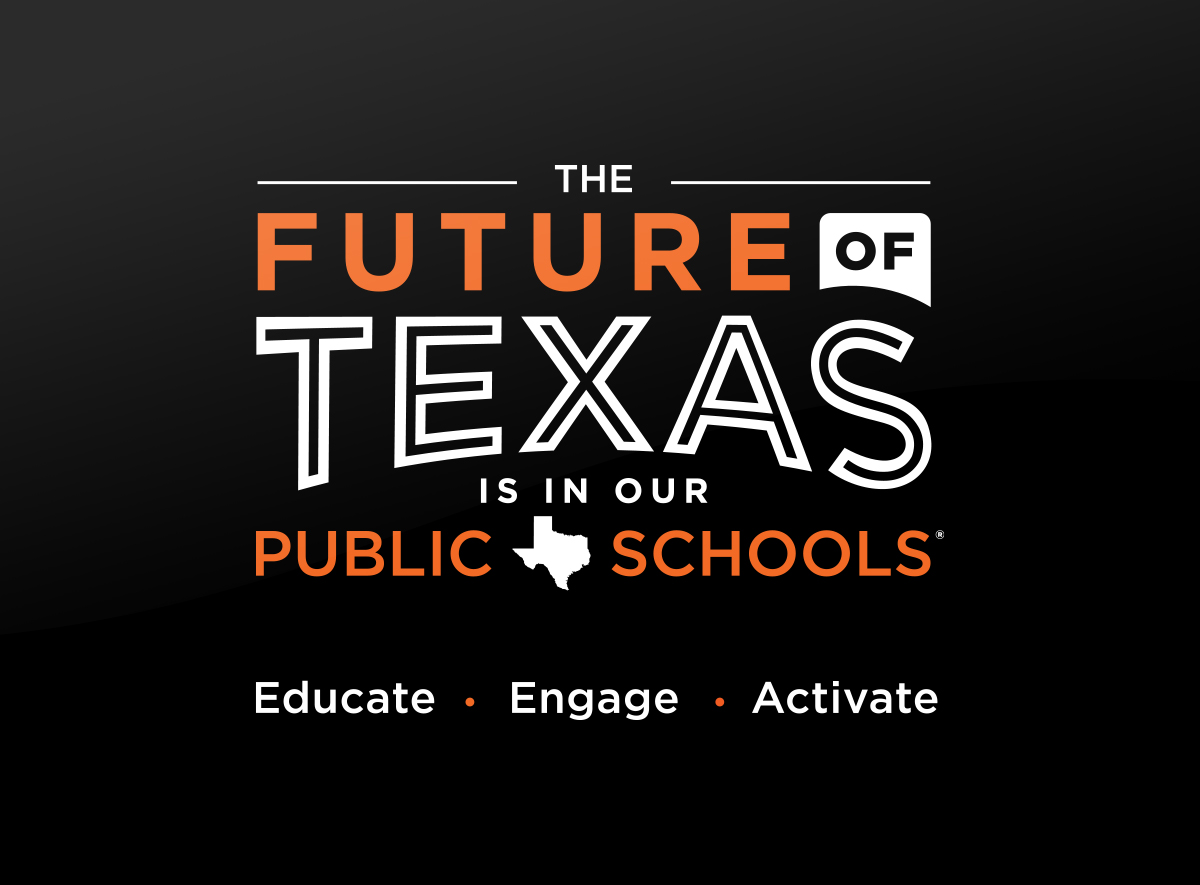
categories
The Show Must Go On

September 03, 2021
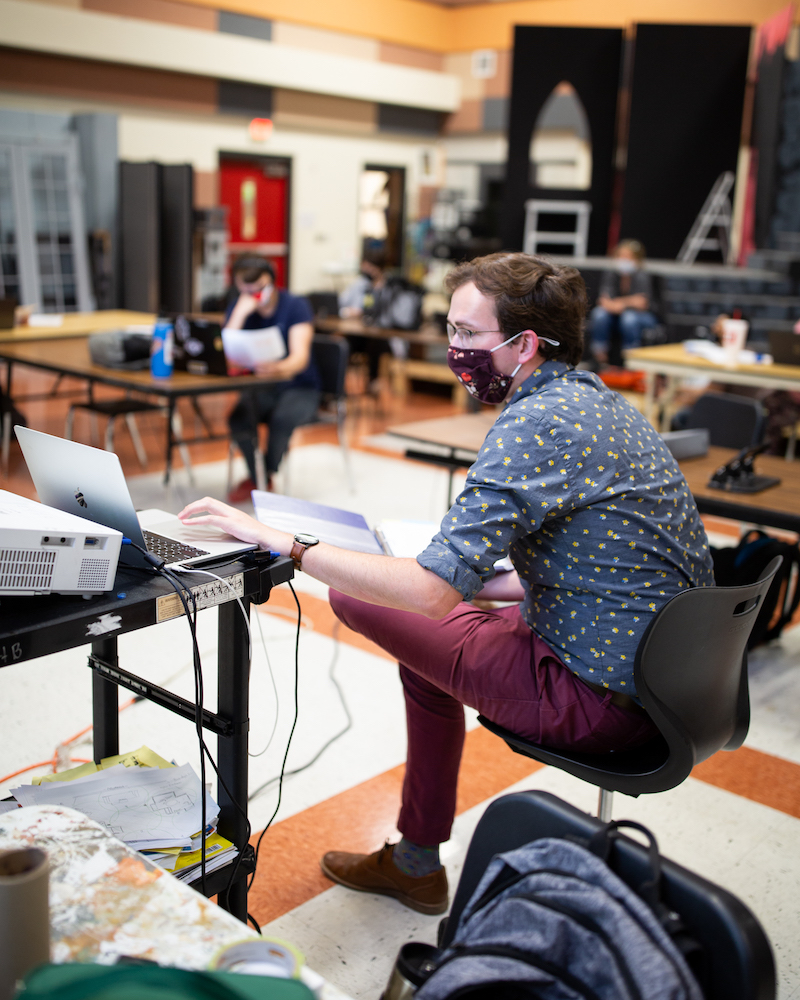
INNOVATIO
The Show Must Go On: Persisting in a Pandemic
September 3, 2021
Three theatre teachers demonstrate an indomitable and innovative spirit in their approach to engaging and empowering students in COVID times.
“Amazing” is how Jeremy Cantu, a sophomore in San Antonio ISD described the 2020-2021 school year – a year, that for many, was ripe with uncertainty and fear.
Despite the pandemic and surrounding challenges, Jeremy found joy and courage thanks to the unwavering efforts of his theatre teachers.
“We managed to stay and keep going, making productions, making happiness really.When COVID-19 forced Texas to lock down in March of 2020, educators were presented with an impossible job. Not only did they have to quickly adapt to remote instruction, but they had to find ways to locate and engage a student body that was no longer connected to a physical building.
For the remainder of the spring semester, teachers were focused on responding to the ongoing crisis. Their first priority was to ensure students were safe and their basic needs were met, followed by supplying students with the technology, materials, and internet access necessary for remote learning.
The summer became about adapting to the new reality and making a series of contingency plans around the countless unknowns facing the fall semester.
For theatre teachers at the Advanced Learning Academy (ALA) and Center for Applied Science and Technology (CAST) – Tech program in San Antonio ISD, it was never a question of if they were going to produce a fall musical, but a matter of how they were going to pull it off.
They understood what was on the line if their students lost the chance to collaborate on a show, build confidence as performers and theatre technicians, and find belonging within a school community.
This team of teachers resolved they would do whatever it took to deliver on the great theatre maxim “the show must go on.
The Show Must Go On: Persisting in a Pandemic from Raise Your Hand Texas on Vimeo.
Our Place in Time
Preparing for the start of school last August, theatre teachers Amy Stengel, Nicholas “Nico” Champion, and Kimberly Bianco had hoped to put on a socially distanced performance of The Little Mermaid on an outdoor stage. However, they quickly realized their initial plan for the fall musical wasn’t going to work.
Reevaluating, the three teachers determined the safest and most accessible strategy was to produce the musical over Zoom. They decided to create their own production of songs and connected scenes that could expand to accommodate any student who wanted to participate.
“I think it was great for the kids to experience because we never gave up,” Stengel says. “We never said, ‘We’re going to have to cancel the show, guys.’ We just kept trying to find a way to come together and I think that showed them that you can keep pushing forward. It ended up being a strategy that got us
The Show Must Go On: Persisting in a Pandemic
September 3, 2021
Three theatre teachers demonstrate an indomitable and innovative spirit in their approach to engaging and empowering students in COVID times.
“Amazing” is how Jeremy Cantu, a sophomore in San Antonio ISD described the 2020-2021 school year – a year, that for many, was ripe with uncertainty and fear.
Despite the pandemic and surrounding challenges, Jeremy found joy and courage thanks to the unwavering efforts of his theatre teachers.
“We managed to stay and keep going, making productions, making happiness really.”When COVID-19 forced Texas to lock down in March of 2020, educators were presented with an impossible job. Not only did they have to quickly adapt to remote instruction, but they had to find ways to locate and engage a student body that was no longer connected to a physical building.
For the remainder of the spring semester, teachers were focused on responding to the ongoing crisis. Their first priority was to ensure students were safe and their basic needs were met, followed by supplying students with the technology, materials, and internet access necessary for remote learning.
The summer became about adapting to the new reality and making a series of contingency plans around the countless unknowns facing the fall semester.
For theatre teachers at the Advanced Learning Academy (ALA) and Center for Applied Science and Technology (CAST) – Tech program in San Antonio ISD, it was never a question of if they were going to produce a fall musical, but a matter of how they were going to pull it off.
They understood what was on the line if their students lost the chance to collaborate on a show, build confidence as performers and theatre technicians, and find belonging within a school community.
This team of teachers resolved they would do whatever it took to deliver on the great theatre maxim “the show must go on.”
Our Place in Time
Preparing for the start of school last August, theatre teachers Amy Stengel, Nicholas “Nico” Champion, and Kimberly Bianco had hoped to put on a socially distanced performance of The Little Mermaid on an outdoor stage. However, they quickly realized their initial plan for the fall musical wasn’t going to work.
Reevaluating, the three teachers determined the safest and most accessible strategy was to produce the musical over Zoom. They decided to create their own production of songs and connected scenes that could expand to accommodate any student who wanted to participate.
“I think it was great for the kids to experience because we never gave up,” Stengel says. “We never said, ‘We’re going to have to cancel the show, guys.’ We just kept trying to find a way to come together and I think that showed them that you can keep pushing forward. It ended up being a strategy that got us through the whole year.”
The team titled the show Our Place in Time to ground students in conversations around identity and finding one’s place in the world. Each of the teachers led an aspect of the production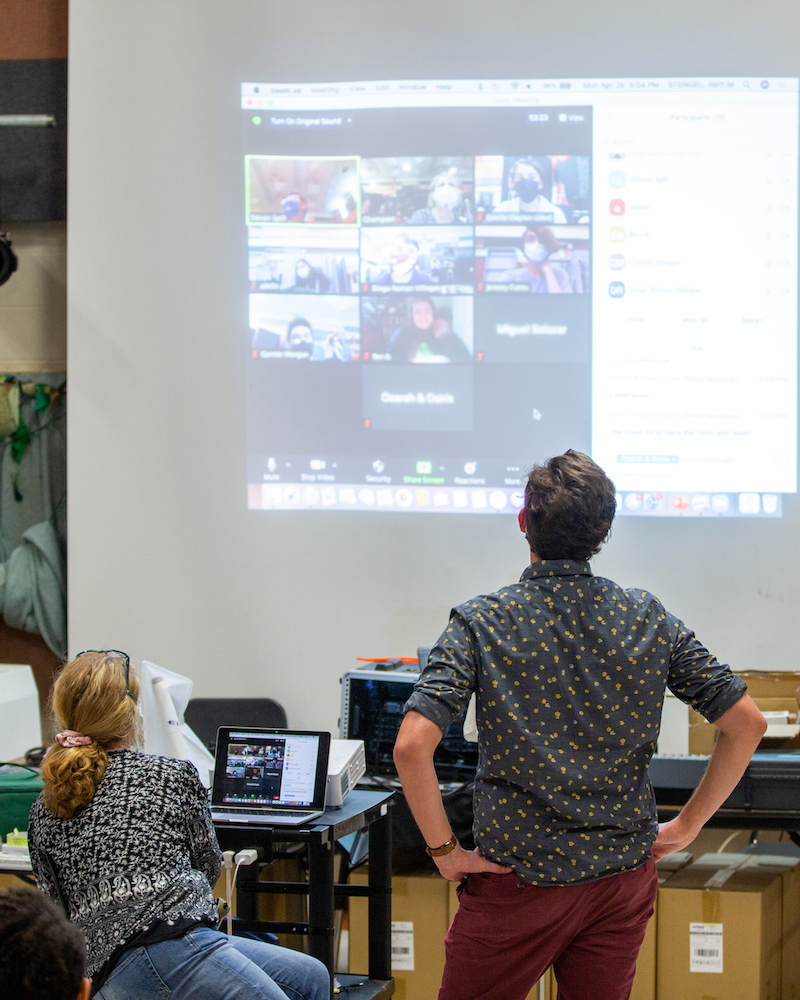
Theatre teachers Amy Stengel and Nico Champion check-in with remote students over Zoom.
Bianco, a longtime musical theatre teacher and vocal coach, helped the students select songs and provided piano tracks for them to practice their singing at home. For ensemble pieces and duets, she worked with the students to layer the tracks and sync all the voices together. Following a long and rewarding tenure in the classroom, Bianco retired at the end of the fall semester.
Stengel specializes in creative writing and theatre tech, including makeup, costumes, set design, and lighting. She worked with a team of student writers to develop the arc of the show and short scenes to weave the songs together. The production included 4th-12th grade students, so the writers explored phases of development. “We put the songs in a sequence of growing up. We started with shows like Matilda and we ended with shows like Mean Girls. There was developmental maturity in the choices. Then we wrote the show around what those characters were going through, what obstacles those characters were facing.”
Champion, a recent graduate from Trinity University and Charles Butt Scholarship for Aspiring Teachers Alumnus, was just starting his first year of teaching. During the 2019-20 school year he interned at ALA as part of his field-based training for a Master of Arts in Teaching. The relationships and experience he developed during the internship made entering the classroom during a pandemic a less daunting challenge.
Champion directed and blocked the scenes with different groups of students over Zoom. He taught himself video and audio editing so that he could take the students’ recordings and cut the scenes together to meet the cadence and action of each performance. Above all, he prioritized developing relationships, making virtual classes fun, safe spaces for students.
To ensure her theatre tech students were actively included in the production, Stengel organized porch drop-offs to deliver props, backdrops, and lights for students to help assemble or paint. Once a piece was finished, she’d pick it up from one student’s porch and take it to another student’s porch for it to be used in their recording.
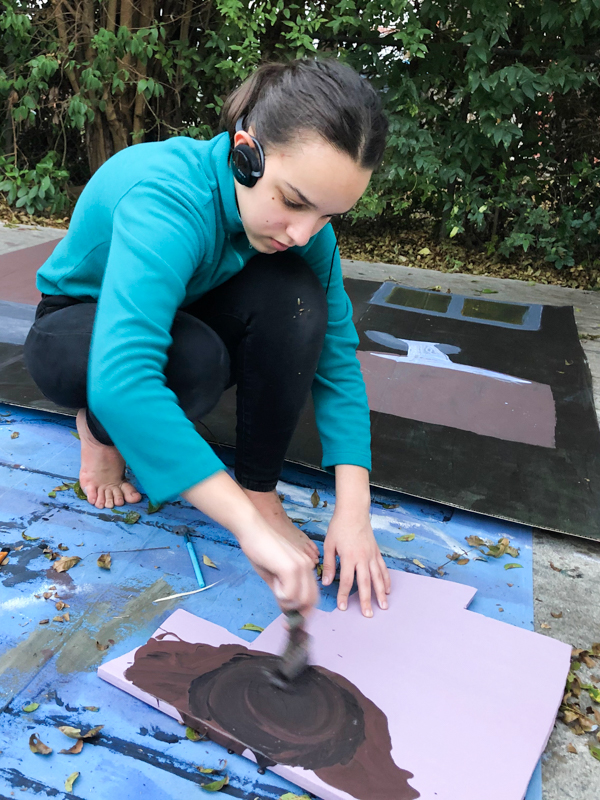
Maya Aparicio, a 7th-grade theatre tech student at the Advanced Learning Center in San Antonio ISD, paints a backdrop in her driveway. During a spike in the pandemic, the school’s theatre teachers drove across the city to drop supplies on porches for students to construct backdrops and props for use in the virtual show.
By Champion’s account, these efforts to reach students beyond the computer screen paid off with increased trust and engagement from both the students and their families.
“Amy was so brilliantly intentional about that too, in knowing that getting the family involved in that way is a very intentional and effective strategy of getting the students involved also. There were multiple families for whom the show became a family project and they would build things together. That would spur the kids to do that production work, but also, to do work in their other classes as well.”
Three months after embarking on this massive creative undertaking, the virtual musical opened on November 5th. The final cut of the production lasted an hour and forty-five minutes, with over 20 songs. For three nights and a Sunday matinee, the video played over Zoom to an audience across the country. The reviews were celebratory.
Christina Villegas, a mother of two ninth-graders and a senior in the program, was blown away by the teachers, “They just kept coming up with more ways and keeping all the kids engaged, and they didn’t let it stop them. They rose to the challenge and they were able to put on shows and bring everyone together.”
“It put some truth behind that comment that you hear in theater, that ‘the show must go on.’ Failure was not an option.”
Her husband, Eduardo agreed. “It put some truth behind that comment that you hear in theatre, that ‘the show must go on.’ Failure was not an option. They pulled some magic tricks to make things happen. I was amazed. I’m in the technology business. When my son, Diego, was telling me that they’re going to have a theatre production over Zoom, I was thinking, “Oh my God, how did they pull that off?” Going from one scene in one house, to another scene in somebody else’s house and coordinate that and have the music and the lighting, all the special effects. That was just huge. My mind couldn’t even think about how to make that happen. Hats off to them for that. That’s awesome. Awesome.”
Telling stories that matter
As more students came back to campus over the course of the school year, Stengel and Champion adapted their strategy to meet the needs of both remote and in-person students, finding plays that could accommodate a hybrid cast and crew.
They also remained intentional about the types of stories they were telling and the impact on student’s personal identity development and awareness as a global citizen.
“Kids need to see names like theirs in print, by writers who share their experiences. It just touches students and means so much to them.” Stengel says about the importance of bringing cultural relevance to the classroom.
In February, the theatre department partnered with local author Lorenzo Gomez III, to put on a reader’s theatre of his book Tafolla Toro, Three Years of Fear. In the book, Gomez shares his experience of being bullied during his years at Tafolla Middle School in San Antonio ISD and the impact it had on his mental health. As part of the performance, students read aloud letters they wrote to their younger selves following Gomez’s model from the book. They offered impactful words of wisdom, such as not putting so many expectations on yourself or not letting others tell you who to be.
“Lorenzo says he cries every time he hears them read those letters because they’re so powerful,” Stengel says. “That project is continuing, it’ll continue each year.” (In fact, a new production of Tafolla Toro just ran the last weekend of August 2021 and the reviews are in.)
Students at CAST Tech in San Antonio ISD perform a chapter from local author Lorenzo Gomez III’s book “Tafolla Toro, Three Years of Fear” at the Guadalupe Cultural Arts Center.
In April, the crew put on the play Luna exploring the journey of a young girl named Soledad, the daughter of migrant farmworkers. Because her family moves frequently, Soledad is constantly switching schools and struggles to make friends. Her only consistent friend is the moon.
Champion says they selected this show in part because they had a vision for how to project virtual students into the performance and as an opportunity for students to learn more about the experience of a migrant family.
“Theatre as an outlet for students is, generally I think, very important, but it’s also a place for them to discover not only parts of themselves, but also things about the world,” Champion says. “In the same way, taking a US or a world history class opens up your eyes to the geopolitical context of the Middle East, you can also discover that through art. It’s oftentimes a more accessible way for students to begin thinking about that and having those conversations.”
The final play of the year, The Inexperienced Ghost was a fast-paced British farce, offering the community some fun and levity.
As part of a warm-up activity, senior Steven Spill tosses an imaginary ball through the air to illustrate the movement of sound through space.
Shaping a program, shaping the future
The mindset of “rising to the challenge” is not new for Stengel who was given the charge of building the ALA theatre program from scratch when the school was founded in 2016.
Steven Spill, a senior, has been at the school since the start of the program. “Before that stage was there, it was just a platform, and then slowly it got built on and built on,” he says, describing the school’s small black-box theatre. “Being part of [the program], it feels historical. In a school as small as this one with a theatre group that’s even smaller on a do-it-yourself stage, everyone just has this sort of camaraderie that isn’t really replicated anywhere else.”
Fellow senior, Diego Villegas, shares the sentiment. “I didn’t realize how lucky I am that I was able to come at the birth of a program and watch it grow. I feel proud, I feel like I am part of this theatre.” His eyes glisten slightly at the memories and realization that he’ll soon be leaving the school and program behind.
The cast of the “Inexperienced Ghost” pose for a group photo on stage.
For Steven, theatre enhanced his empathy and communication skills. “It heightened my ability to blend in with people because beforehand I wasn’t very adept at talking to other people. Theatre has allowed me to see things from other people’s shoes and maybe adjust my personality to certain situations.”
Diego found tremendous value in developing teamwork and problem-solving skills as part of a cast and crew. “Theatre really is a team sport, coming to work with techies and actors on stage, and getting them to coalesce.
through the whole year.”
The team titled the show Our Place in Time to ground students in conversations around identity and finding one’s place in the world. Each of the teachers led an aspect of the production.
Theatre teachers Amy Stengel and Nico Champion check-in with remote students over Zoom.
Bianco, a longtime musical theatre teacher and vocal coach, helped the students select songs and provided piano tracks for them to practice their singing at home. For ensemble pieces and duets, she worked with the students to layer the tracks and sync all the voices together. Following a long and rewarding tenure in the classroom, Bianco retired at the end of the fall semester.
Stengel specializes in creative writing and theatre tech, including makeup, costumes, set design, and lighting. She worked with a team of student writers to develop the arc of the show and short scenes to weave the songs together. The production included 4th-12th grade students, so the writers explored phases of development. “We put the songs in a sequence of growing up. We started with shows like Matilda and we ended with shows like Mean Girls. There was developmental maturity in the choices. Then we wrote the show around what those characters were going through, what obstacles those characters were facing.”
Champion, a recent graduate from Trinity University and Charles Butt Scholarship for Aspiring Teachers Alumnus, was just starting his first year of teaching. During the 2019-20 school year he interned at ALA as part of his field-based training for a Master of Arts in Teaching. The relationships and experience he developed during the internship made entering the classroom during a pandemic a less daunting challenge.
Champion directed and blocked the scenes with different groups of students over Zoom. He taught himself video and audio editing so that he could take the students’ recordings and cut the scenes together to meet the cadence and action of each performance. Above all, he prioritized developing relationships, making virtual classes fun, safe spaces for students.
To ensure her theatre tech students were actively included in the production, Stengel organized porch drop-offs to deliver props, backdrops, and lights for students to help assemble or paint. Once a piece was finished, she’d pick it up from one student’s porch and take it to another student’s porch for it to be used in their recording.
Maya Aparicio, a 7th-grade theatre tech student at the Advanced Learning Center in San Antonio ISD, paints a backdrop in her driveway. During a spike in the pandemic, the school’s theatre teachers drove across the city to drop supplies on porches for students to construct backdrops and props for use in the virtual show.
By Champion’s account, these efforts to reach students beyond the computer screen paid off with increased trust and engagement from both the students and their families.
“Amy was so brilliantly intentional about that too, in knowing that getting the family involved in that way is a very intentional and effective strategy of getting the students involved also. There were multiple families for whom the show became a family project and they would build things together. That would spur the kids to do that production work, but also, to do work in their other classes as well.”
Three months after embarking on this massive creative undertaking, the virtual musical opened on November 5th. The final cut of the production lasted an hour and forty-five minutes, with over 20 songs. For three nights and a Sunday matinee, the video played over Zoom to an audience across the country. The reviews were celebratory.
Christina Villegas, a mother of two ninth-graders and a senior in the program, was blown away by the teachers, “They just kept coming up with more ways and keeping all the kids engaged, and they didn’t let it stop them. They rose to the challenge and they were able to put on shows and bring everyone together.”“It put some truth behind that comment that you hear in theater, that ‘the show must go on.’ Failure was not an option.”
Her husband, Eduardo agreed. “It put some truth behind that comment that you hear in theatre, that ‘the show must go on.’ Failure was not an option. They pulled some magic tricks to make things happen. I was amazed. I’m in the technology business. When my son, Diego, was telling me that they’re going to have a theatre production over Zoom, I was thinking, “Oh my God, how did they pull that off?” Going from one scene in one house, to another scene in somebody else’s house and coordinate that and have the music and the lighting, all the special effects. That was just huge. My mind couldn’t even think about how to make that happen. Hats off to them for that. That’s awesome. Awesome.”
Telling stories that matter
As more students came back to campus over the course of the school year, Stengel and Champion adapted their strategy to meet the needs of both remote and in-person students, finding plays that could accommodate a hybrid cast and crew.
They also remained intentional about the types of stories they were telling and the impact on student’s personal identity development and awareness as a global citizen.
“Kids need to see names like theirs in print, by writers who share their experiences. It just touches students and means so much to them.” Stengel says about the importance of bringing cultural relevance to the classroom.
In February, the theatre department partnered with local author Lorenzo Gomez III, to put on a reader’s theatre of his book Tafolla Toro, Three Years of Fear. In the book, Gomez shares his experience of being bullied during his years at Tafolla Middle School in San Antonio ISD and the impact it had on his mental health. As part of the performance, students read aloud letters they wrote to their younger selves following Gomez’s model from the book. They offered impactful words of wisdom, such as not putting so many expectations on yourself or not letting others tell you who to be.
“Lorenzo says he cries every time he hears them read those letters because they’re so powerful,” Stengel says. “That project is continuing, it’ll continue each year.” (In fact, a new production of Tafolla Toro just ran the last weekend of August 2021 and the reviews are in.)
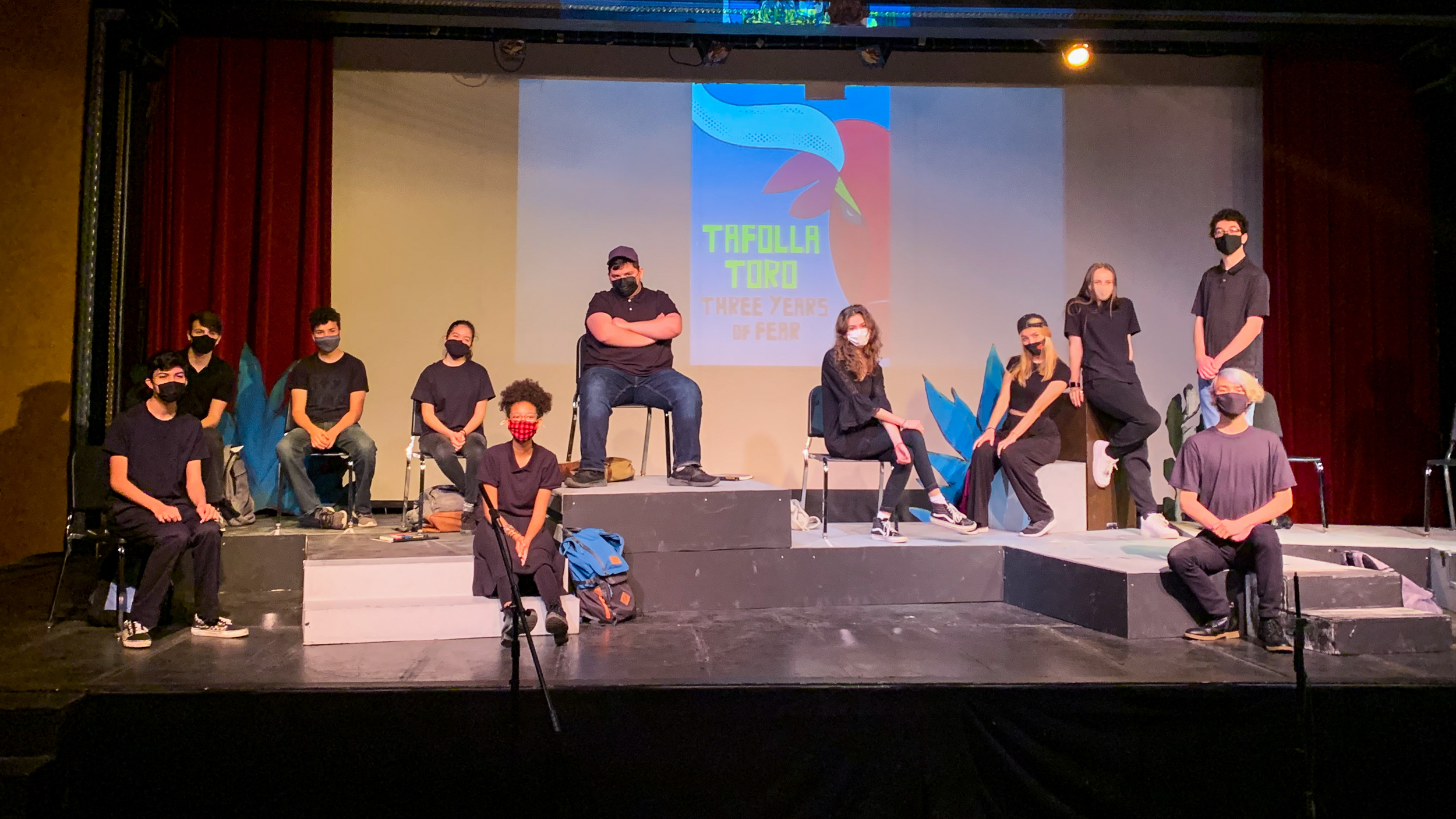
Students at CAST Tech in San Antonio ISD perform a chapter from local author Lorenzo Gomez III’s book “Tafolla Toro, Three Years of Fear” at the Guadalupe Cultural Arts Center.
In April, the crew put on the play Luna exploring the journey of a young girl named Soledad, the daughter of migrant farmworkers. Because her family moves frequently, Soledad is constantly switching schools and struggles to make friends. Her only consistent friend is the moon.
Champion says they selected this show in part because they had a vision for how to project virtual students into the performance and as an opportunity for students to learn more about the experience of a migrant family.
“Theatre as an outlet for students is, generally I think, very important, but it’s also a place for them to discover not only parts of themselves, but also things about the world,” Champion says. “In the same way, taking a US or a world history class opens up your eyes to the geopolitical context of the Middle East, you can also discover that through art. It’s oftentimes a more accessible way for students to begin thinking about that and having those conversations.”
The final play of the year, The Inexperienced Ghost was a fast-paced British farce, offering the community some fun and levity.
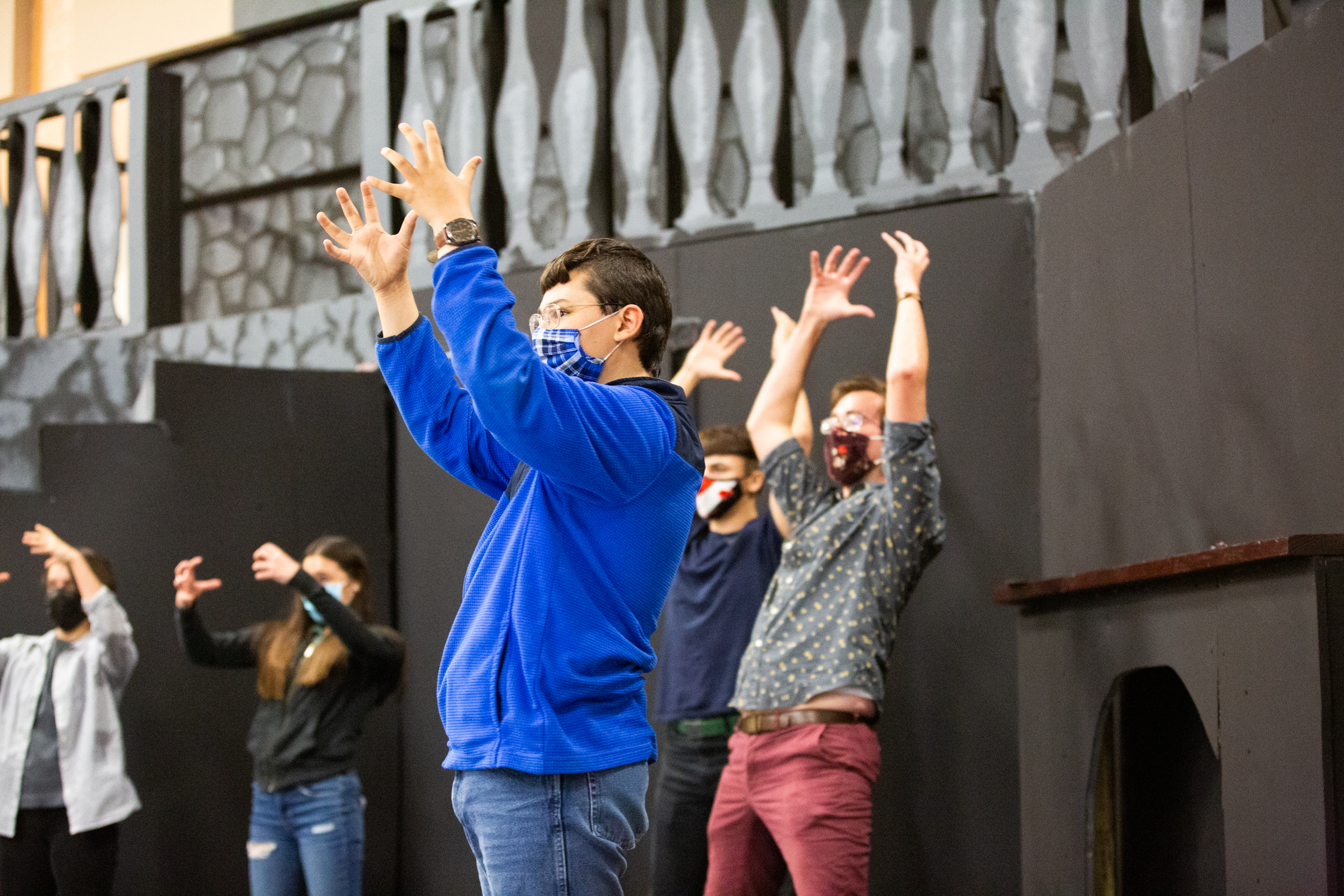
As part of a warm-up activity, senior Steven Spill tosses an imaginary ball through the air to illustrate the movement of sound through space.
Shaping a program, shaping the future
The mindset of “rising to the challenge” is not new for Stengel who was given the charge of building the ALA theatre program from scratch when the school was founded in 2016.
Steven Spill, a senior, has been at the school since the start of the program. “Before that stage was there, it was just a platform, and then slowly it got built on and built on,” he says, describing the school’s small black-box theatre. “Being part of [the program], it feels historical. In a school as small as this one with a theatre group that’s even smaller on a do-it-yourself stage, everyone just has this sort of camaraderie that isn’t really replicated anywhere else.”
Fellow senior, Diego Villegas, shares the sentiment. “I didn’t realize how lucky I am that I was able to come at the birth of a program and watch it grow. I feel proud, I feel like I am part of this theatre.” His eyes glisten slightly at the memories and realization that he’ll soon be leaving the school and program behind.
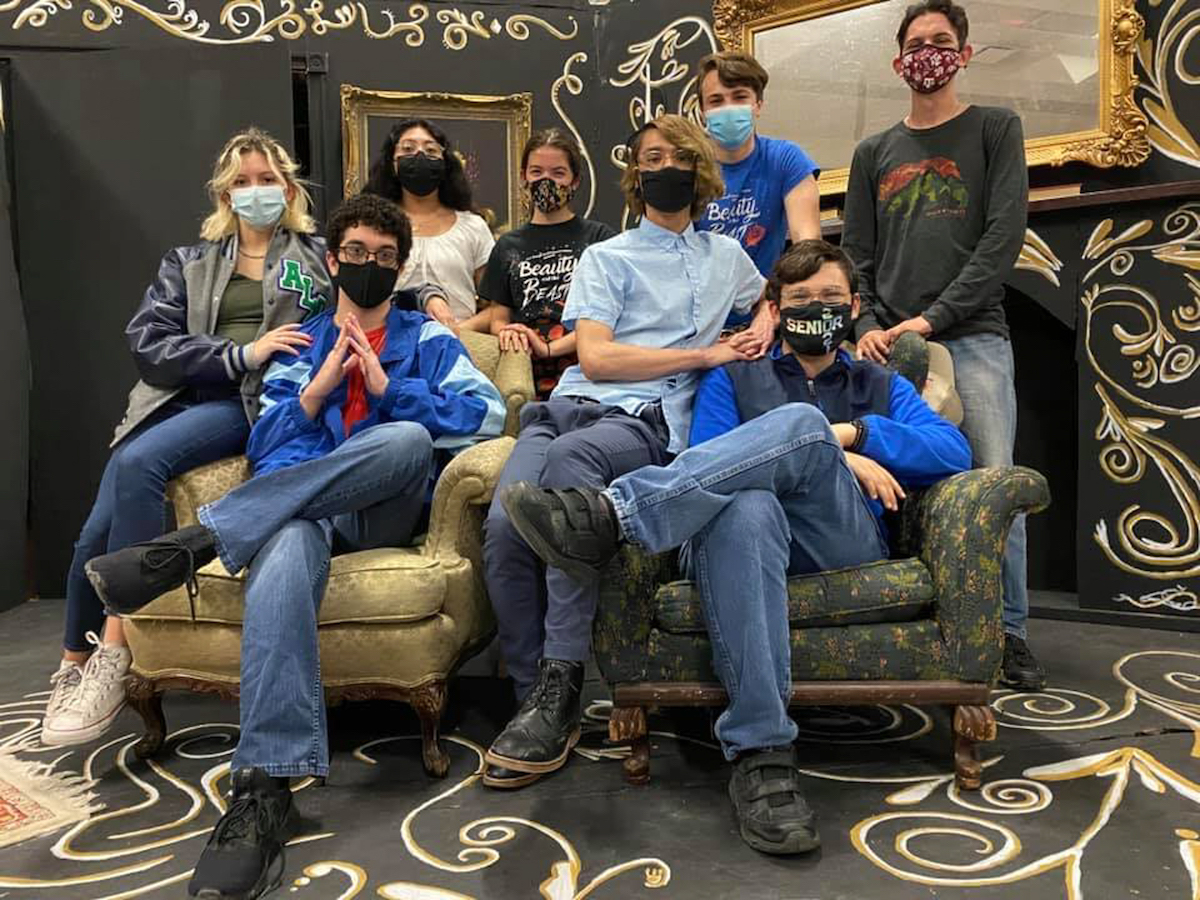
The cast of the “Inexperienced Ghost” pose for a group photo on stage.
For Steven, theatre enhanced his empathy and communication skills. “It heightened my ability to blend in with people because beforehand I wasn’t very adept at talking to other people. Theatre has allowed me to see things from other people’s shoes and maybe adjust my personality to certain situations.”
Diego found tremendous value in developing teamwork and problem-solving skills as part of a cast and crew. “Theatre really is a team sport, coming to work with techies and actors on stage, and getting them to coalesce. Even setting up a stage in seven minutes for UIL productions.”
When these interviews were captured last spring, Steven had recently been accepted into Trinity University where he plans to major in physics. Diego had his sights set on the Air Force Academy, following in his father’s footsteps.
While they are moving into disparate fields from theatre, both young men say they will put to use many of the skills they developed while collaborating on productions. Being part of meaningful shows and helping to shape a program has strengthened their character and impacted who they are as thinkers and future leaders.
